While the Bible will always be my primary source for learning about God and growing my faith, over the last few years the Lord has used books by Christian authors to inform my faith in some interesting ways. The books in today’s round-up explore different aspects of Christianity, shedding light on the life of a believer. Three of the four titles are from the same author, for reasons that will become obvious when you read the reviews.
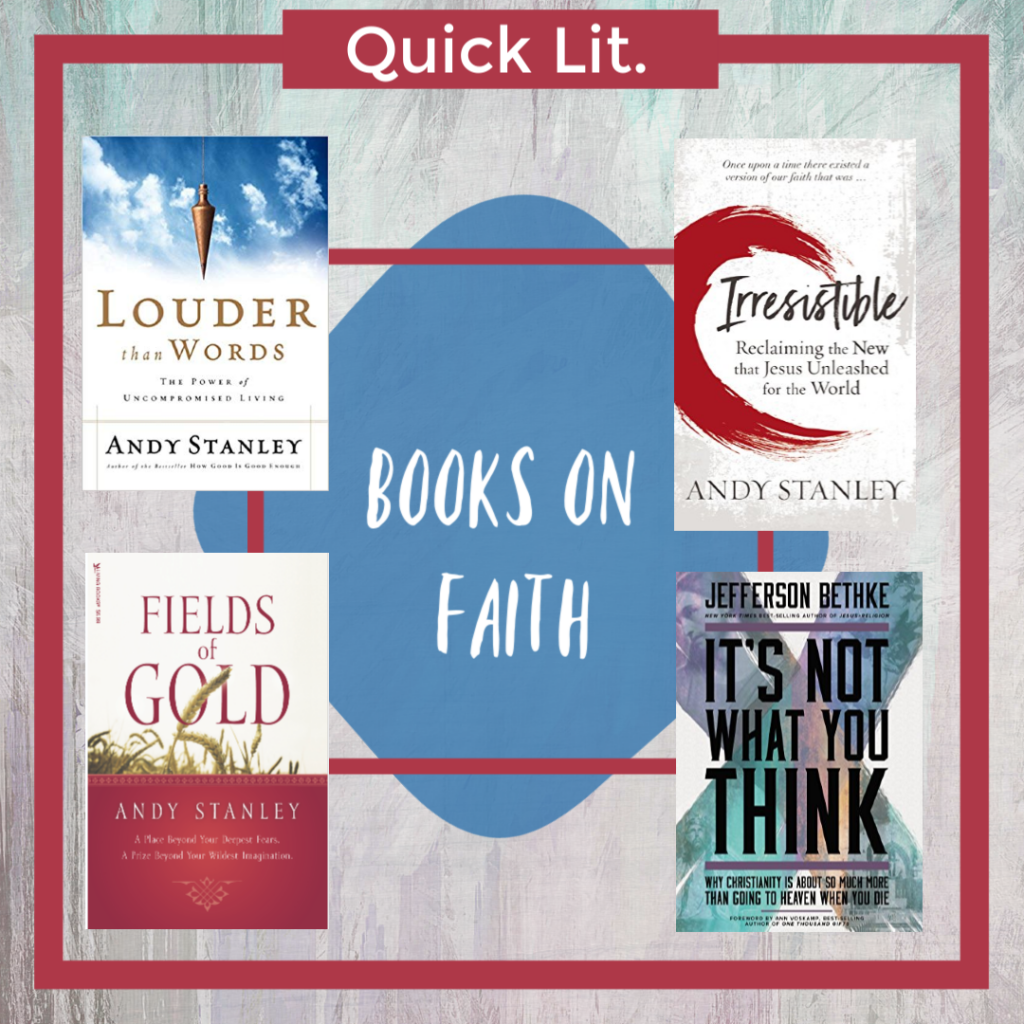
It’s Not What You Think: Why Christianity Is About So Much More Than Going to Heaven When You Die, by Jefferson Bethke: As Christians it’s easy to become complacent in our views of God and Scripture. We accept the ideas that we grew up with or that are fed to us on Sunday mornings without taking time to explore the intricacies of our beliefs or to study the Bible within the context it was written. Hence, we can end up with a lot of wrong thinking surrounding our faith. In this book, Christian influencer Jefferson Bethke debunks some common Christian myths about things like worship, the kingdom of God, sabbath, and communion. In his reexamination of these ideas, he strips Christianity of the religiosity and cultural misunderstandings that have been imposed on it, honing in on the relationship that is at our faith’s core.
Few of Bethke’s ideas were new to me, but I imagine they would be fresh and helpful for many who are new to Christianity or who haven’t spent much time exploring the Bible outside of Sunday morning sermons. Bethke’s writing is backed by Scripture and incorporates enough analogies and anecdotes to make it relatable and engaging. This is a quick read and a worthwhile one for anyone looking for a less conventional (but still Biblical) discussion of Christianity.
My Rating: 4 Stars.
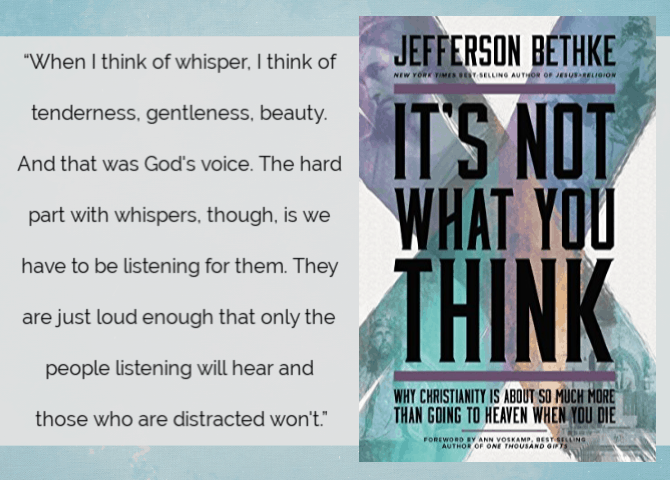
Louder Than Words, by Andy Stanley: This book—from the lead pastor at Northpoint, Atlanta, with which our own church is affiliated—was a monthly reading selection for Luke’s leadership group, and I’m glad I had the opportunity to read it alongside them.
In Louder Than Words, Stanley argues that one’s character is the biggest determining factor of success and influence in this life. Stanley defines character as the will to do what is right, as defined by God, regardless of personal cost, and our character is not stagnant: it is always developing or deteriorating. And more than our accomplishments, acquisitions, of anything else, our character determines our legacy.
After thoroughly defining character and making a strong case for its importance, Stanley walks readers through specific steps of developing a Godly character. This is not easy and entails challenging actions such as forgiveness, repentance and renewal. Stanley uses personal stories, Biblical illustrations, and memorable anecdotes to impart a teaching that is timely, convicting, and of eternal importance.
Many pastors today prefer to gloss over the importance of things like integrity and character for fear of offending their readers or congregations. I appreciated Stanley’s uncompromising approach, which holds tightly to Scripture and is compassionate but unwaveringly grounded to truth. While many of his steps are easier said than done, Stanley reminds us that the development of character is a joint undertaking between us and our Creator. God desires to recreate us from the inside out and when we align ourselves with his will, He will effect a change in us that will speak volumes.
My Rating: 4 Stars.
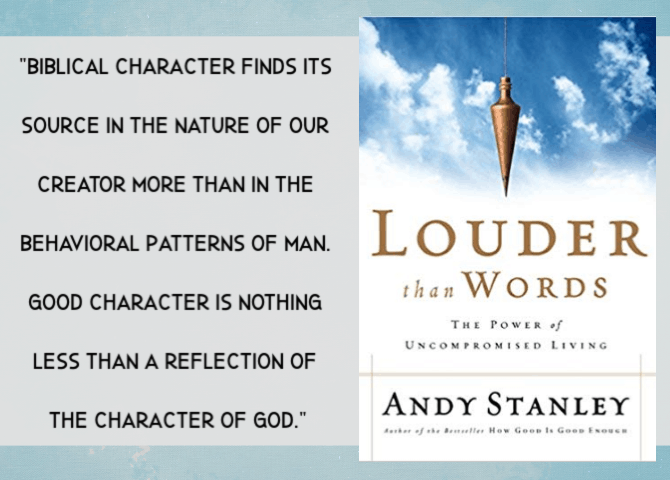
Fields of Gold, by Andy Stanley: This is another title I read along with Luke and his leadership group and to be totally honest, it is a book I would have avoided if it weren’t “assigned reading”: like most Christians, I have sat through countless sermons on finances and giving and thought I’d already heard everything there was to be said about the subject. But in Fields of Gold, Stanley takes a different approach to the subject that I found intriguing.
The book builds on the premise of sowing and reaping. Many of our financial decisions are guided by irrational fear, rather than faith. Fear leads us to prioritize our own security instead of joining the Lord in Kingdom work. But we sow what we reap, so giving (or not giving) out of fear simply breeds more fear while sowing faith allows us to reap eternal rewards. When we begin to view our finances from God’s perspective, seeing ourselves as stewards of resources that belong to Him, our giving will begin to align with His agenda—and this ultimately benefits us more than the false sense of security we get by holding onto our money.
While I worried that this book would be a variation of the prosperity Gospel, this is not the case. Stanley is clear that we aren’t to give simply to receive more, but that the goal of trusting God with our finances is deeper intimacy with God. I appreciated Stanley’s Biblically sound perspective and found his illustrations helpful and memorable. I also liked that his message moved beyond vague principles to get practical about how to begin giving in a healthy way. His message is very convicting and I believe it’s supposed to be: acting in defiance of our fears is never easy. But the Bible (and this book) is clear that this is exactly what we are called to do.
My Rating: 4 Stars.
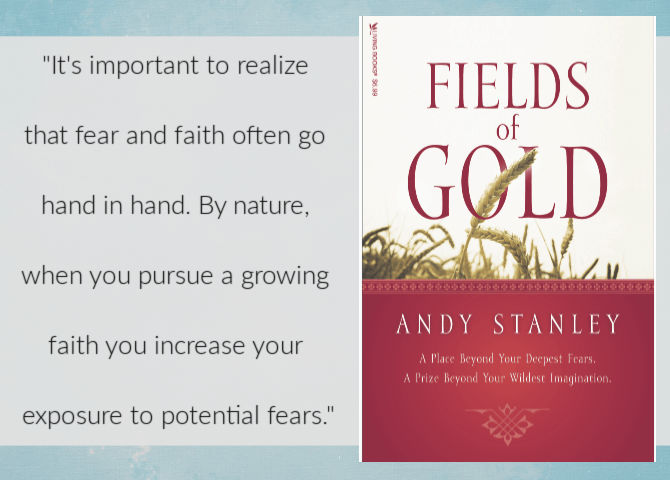
Irresistible: Reclaiming the New that Jesus Unleashed for the World, by Andy Stanley: This was yet another book I read alongside Luke’s Leadership Group at church. (Can you tell that our church leadership is a fan of Andy Stanley?!) Luke read it a few days before me and gave me a head’s up that there was some content I might not totally agree with, and he was absolutely right.
The book is Stanley’s effort to lead the church in becoming more irresistible to the growing number of unbelievers—specifically former believers—in our country. I am 100% on board with this: I believe that the church is too often associated with what we are against and not what we are for. To overcome this perception, Christians need to stop being culture’s morality police and instead put Jesus and His core message of love at the center of everything we say, do, and believe . . . and if we do this, our message will be irresistible to others.
I would have loved for Stanley to keep these simple concepts as the focus of his book. Instead, he claims that the reason Christianity is NOT irresistible to today’s generation is due to the church’s blending of old and new covenants—our embracing of both the God of the Old Testament and Jesus of the New Testament—thereby creating an image of God that seems inconsistent and that, according to Stanley, is not accurate. Stanley believes that Jesus not only ushered in a new covenant (which I agree with) but that He rendered the entire Old Covenant—including the entire Old Testament—irrelevant. Stanley makes a case for why the Old Testament no longer has a place in the church, stating that it should be viewed as a historical document and nothing more. He also spends several chapters arguing that the Bible (even the New Testament) is not the basis for our faith, Jesus is.
There is so much about Stanley’s message that I find problematic. I agree that Jesus is basis of Christianity, but without the Bible, we would not have knowledge of Jesus. The Bible IS important. And the Old Testament is important too, as more than just a historical document; it is a guidebook, a window into the character of God, and a foreshadowing of Christ, who would not have been recognized as the Messiah if not for those Scriptures. It’s dangerous to start picking and choosing which parts of the Bible we will believe and which we will disregard. YES, we need to utilize discretion in applying aspects of the Bible to our life, and we need to know the context for every story and message—in both the Old AND New testaments. But the answer isn’t simply to cut off a huge portion of God’s Word.
My list of arguments against this book is long, much too long for a book review. However, I don’t regret reading it. As I mentioned at the start of the review, Stanley makes many valid points about the church and the way we present ourselves in today’s culture. I appreciate the questions he raises, and the reminder that our faith does not hinge on our blind acceptance of all of Scripture but on our wholehearted embracing of Christ. I learned a lot about the history of Christianity and Judaism, and about the ways we interpret the Bible. Stanley’s writing is engaging, humorous, and easy to follow, and his argument is compelling if problematic.
When Luke discussed some of our reservations about the book with a pastor at our church, he passed on this trio of articles in which a pastor addresses the shaky theological aspects of Irresistible and Stanley responds. The interviews solidified my reservations.
I would love to discuss this book with a group of trusted believers, but I would not feel comfortable putting it into the hands of a new Christian whose takeaway would likely be to simply stop reading the Bible, which is not at all what I believe God calls us to do.
My Rating: 2.5 Stars.
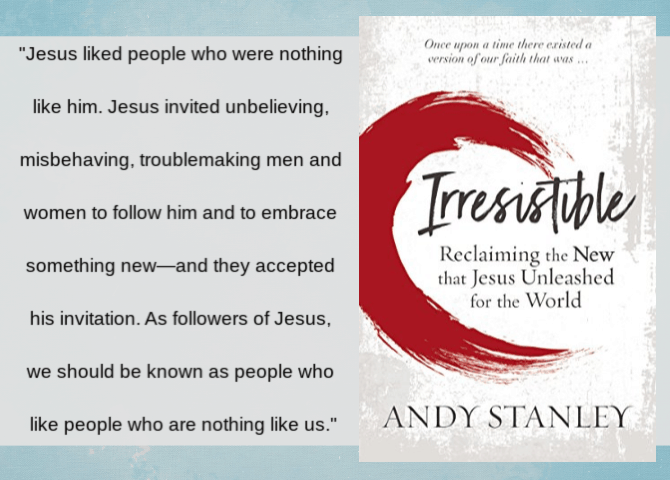
Have you ever read a book that changed the way you viewed God, the Bible, or your personal faith? Or a book that you assumed would be in line with your view of Scripture, but was not?